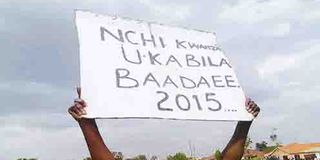Cementing stability one of Magufuli’s vital challenges assignment

Someone waves aloft, a placard that stresses patriotism as a crucial attribute, and condemns tribalism. It was at a rally during the latest election season. Ethnic divisions, religious bigotry and cronyism are slowly but surely finding their way into Tanzanian society, threatening the foundations of the stable and peaceful state. PHOTO | FILE
What you need to know:
This is the moment when the expected commercial natural gas exploitation from the 50 trillion cubic feet reserves could change the country for the better.
Dar es Salaam. President John Magufuli takes over the reins at a critical time in the developmental trajectory of the country.
This is the moment when the expected commercial natural gas exploitation from the 50 trillion cubic feet reserves could change the country for the better.
But President Magufuli is taking the leadership of the country at a time when Tanzanians quest for change is strong.
To put it simply Tanzanians want change. And they want change now.
It is how Dr Magufuli delivers on his promises and on how he, generally, manages the expectations that will partly define his legacy.
His harder task, however, would be how to manage a healing process and repair the huge cracks that have already started widening and which threaten peace, unity and harmony in the country.
All is not well in Tanzania. Progress made decades ago in terms of ending ethnic divisions, religious bigotry and cronyism is fast being rolled back by a section of the elite for their own personal, political and economic gains.
These people will stop at nothing to divide Tanzanians according to their tribes and religion if that will guarantee them get what they want. Unfortunately this is happening at an alarming, faster rate. Tanzanians are now starting to identify themselves more with folks from the same region, the same religion and the same tribe.
What makes the situation even more worrying is the sense of denial that seems to dominate all conversations on ethnic and religious divisions. Those who keep raising the issues are easily labeled cynical and pessimists.
It is not lost on keen observers, however, that before he passed away the father of the nation Mwl Julius Nyerere used every opportunity he got to warn Tanzanians against the dangers of entertaining tribalism.
He stated categorically that he has seen signs of open ethnic divisions and that the nation has started walking back from the foundations of its nationhood.
The man who created Tanzania; the leader who worked tirelessly and selflessly trying to ensure every word he uttered, all policies he undertook and every action he took while in office translated into a unified country from a collection of tribes and religions, was worried stiff, in his last days, about the prospects of a divided Tanzania. His worst fears were to witness the undoing of what he spent so much time creating.
The recent elections exposed Tanzania’s faulty lines in and manifested entrenched tribalism and religious bigotry in the country. Politicians made utterances in campaign platform that were anathema just some few decades down the line. There are those who think such utterances were part of elections gimmicks and campaign tactics, and that they would go away when elections are over.
But proponents of this view miss the point because discriminations based on tribe, region or religion are the major sources civil strife in Africa. Demonizing the others because they are from a particular tribe or region as we saw during the last elections is dangerous to the wellbeing of the nation.
And if this trend is left to continue Tanzania will reach a point of no return. We would be cheating ourselves by thinking that Tanzania is so peaceful, so stable that it cannot break apart. It would if we continue to sow seeds of divisions. It happened before. Some African countries just fell apart after years of taking peace and stability for granted. Somalia, Liberiax and Cote d’Ivoire are a case in point. After years of peace and stability the two countries fell into anarchy.
In a speech in 1995 Mwl Nyerere warned Tanzanians against lowering their guards and allow some few individuals to divide them.
He said Tanzania is still a very young nation that, like many other African countries, does not make economic, political, social and even geographical sense.
In such a situation it becomes so difficult to keep a country together. Constant care is needed. All signs of divisions and of disruption of peace must be fought against. The gains of peace and stability already made must be cemented.
It is at this point that President Magufuli comes in. As he starts the journey of leading Tanzania in the next five years, and possibly ten, he should craft policies and adopt some of the original measures that helped put the foundations of unity in the first place.
He should also undertaking meaningful economic growth policies that reduce poverty, that bridge the gap between the rich and poor and which facilitate the improvement of social services.
He must also ensure that national development is equitable with care taken to ensure all regions receive a fair share. He should do away with rural neglect, which is dangerous and useless.
Time has come to improve infrastructure and social services in rural areas to stop the ever increasing rural-urban migration of the millions of jobless youth.
Towns can no longer accommodate all the young people running away from villages.
Education is key. President Magufuli should undertake education reforms and invest adequately in primary, secondary and vocation training to ensure young men acquire skills to make them easily employable in the expanding private sector. The education should also enable young people employ themselves.
Providing free education without improving the quality of education will backfire.
But Magufuli must also preside over efforts to renew Tanzanians sense of patriotism, responsibility and self-improvement. The point must be made that without each individual working hard and pay taxes the change that Tanzanians cringe for might remain a pipe dream.
This could be done through education in schools, church teachings, seminars in workplaces and in national services.




